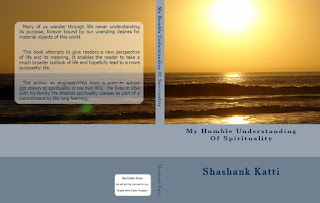This is one of the articles in a book I have written on spirituality. The book is available on Amazon.com.
The Spirit Of Spirituality
-------------------------------
Note to the readers: I would suggest that readers see my earlier blog on the first verse of the Gita before they read this.
ayanesu ca sarvesu yatha-bhagam avasthitah
bhismam evabhiraksantu bhavantah sarva eva hi
Meaning: Now all of you must give full support to Grandfather Bhisma, standing at your respective strategic points in the phalanx of the army.
Commentary:
The context of the Gita is the battlefield of Kurukshetra where the righteous Pandavas are arraigned against their own cousins, the wicked Kauravas. Duryodhana, the eldest son of Dhritarashtra is seen talking to his teacher, Dronacharya and specifically he requests everyone to protect Bhishma, the great grand sire, who out of a feeling of obligation is fighting on behalf of the Kauravas even though he knows he is on the wrong side.
Let us look at this request of Duryodhana to protect and support Bhishma from two angles. One is from the normal historical and strategic perspective. Bhishma was always known across India as a great warrior and a very righteous person. When the great war was announced, various kings across the country had a difficult choice to make on which side to support. Most of them knew that Pandavas were right and had to be supported. But still seeing Bhishma, the righteous warrior amongst and leading the Kauravas, many of them decided to align with the Kauravas trusting that Bhishma was doing the right thing. Duryodhana knew that if Bhishma fell, many of these kings that had aligned with him would desert him. Hence there was a strategic reason in asking his commanders to ensure that Bhishma was supported and protected.
Now, let's look at it from a spiritual angle. Duryodhana represents Desire. In each of us it is the desire that propels us into doing various activities, good or bad which bind us into karma's laws as discussed in an earlier blog. This desire for worldly things, when it sees the goodness and righteousness of an intense sadhak, becomes afraid and the first thing it does is go to seek support of past habits. In the context of the Mahabharatha Drona represents past habits, which can be good or bad. But more often than not, bound as we are by our past actions and intense ignorance of Reality, our Drona becomes bad habits. How often has it not been that we promise to give up a desire and say finally that we failed because we are habituated. So whenever the intellect helps us make a resolution to give up desires, desires take the support of past habits to defeat the intellect's resolve.
Now, let us see why desire arises. Desire arises only when I as an individual forget that in reality I am the Supreme. In this state of duality, where I see myself as separate from the world outside, I am either attracted to the objects outside and want to possess them or am repelled by certain objects and have a desire to avoid them . Hence the genesis of desire is that feeling that I am separate from the Truth or Consciousness. This "I ness" or " my ness" is referred to as "ego". One needs to be careful not to think of ego as in common parlance as " he has a big ego.". We are not talking of that ego. Ego in spiritual terms is that thing because of which I feel I am separate and am distinct from the Supreme.
In the context of the Mahabharatha, Bhishma represents "ego". As we saw above, if ego(Bhishma) is destroyed, then there are no desires(Duryodhana) at all. This implies that desires are defeated if ego dies through intellectual and righteous effort (Pandavas). That is the reason that desires to continue their sovereignty over us and win the battle , command the past habits to protect the ego.



No comments:
Post a Comment
Please leave comments for me here.